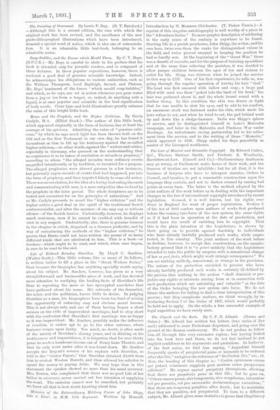Moses and the Prophets, and the Higher Criticism. By Gavin
Carlyle, M.A. (Elliot Stock.)—The author of this little book, which appeared originally in the form of lectures, has at least the courage of his opinions. Admitting the value of "genuine criti- cism," by which he says much light has been thrown both on the Old and on the New Testament in our own day, ho has found it incumbent on him to lift up his testimony against the so-called higher criticism,—in other words, against the " writers and critics, .especially in Germany, who proceed on the understanding that no cognisance is to be taken of revelation or miracle or prophecy," according to whom "the alleged miracles were ordinary events snagnified intentionally or by tradition, or invented for a purpose. The alleged prophecies were shrewd guesses in a few instances, but generally vague records of events that had happened, put into the form of prophecy, and then imputed falsely to some old writer. There was no revelation, for the idea of a loving God ruling the earth and communicating with mon, is a mere subjective idea evolved by the prophets in the later period. The whole Scriptures are to be tested and accounted for on the principles of naturalism." And so Mr. Carlyle proceeds to assail the "higher criticism" and the higher critics a good deal in tiro spirit of the traditional Scotch controversialist, and after the manner—if one may say so without offence—of the Scotch terrier. Undoubtedly, however, he displays much acuteness, even if he cannot be credited with breadth of view in any respect. Undoubtedly, also, there is genuine humour in the chapter in which, disguised as a German professbr, and by way of caricaturing the methods of the "higher criticism," ho groves that Burns could not have written the poems of eo many different kinds that are attributed to him. This is a book—or brochure—which ought to be read, and which, when once begun, is sure to be read to the end.






































 Previous page
Previous page